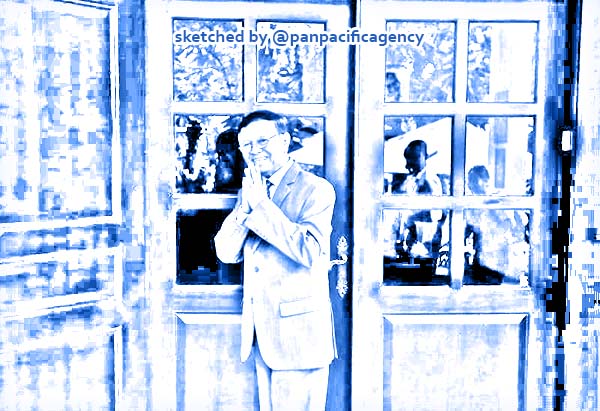[Analytics] Cambodia’s year of political limbo

Cambodian opposition leader Kem Sokha greets media at his home in Phnom Penh on Nov 13, 2019. (Reuters photo). Sketched by the Pan Pacific Agency.
Cambodian politics in 2019 was characterised by tension and uncertainty. A contentious election in July 2018 in which the ruling Cambodian People’s Party faced no serious competition has been followed by a progressive habituation to a de facto one-party system. But a ‘new normal’ has yet to settle in. Astrid Noren-Nilsson specially for the East Asia Forum.
Uncertainty emanated from the European Union launching an investigation under the procedure for a possible temporary withdrawal of its Everything But Arms (EBA) trade preferences in February. The investigation was triggered by the dissolution of the opposition Cambodia National Rescue Party (CNRP) and the arrest of its president Kem Sokha on treason charges in 2017.
The Cambodian government has pursued a two-pronged strategy where it sought to maintain Cambodia’s EBA status through diplomacy, while projecting a facade of complete indifference over the EBA’s future. This was a bid to project strength and raise its bargaining position, but also reflected confidence as the government has readied itself for a post-EBA scenario. Measures include reserving US$3 billion for fiscal stimulus, raising tax revenue by 20 per cent by 2020, and negotiating a free trade agreement with China.
In November, the European Union sent a preliminary report to the Cambodian government indicating it will likely withdraw the EBA status. Radio Free Asia, accessing a leaked copy, reported that the European Union judged efforts to date as insufficient, citing a further deterioration of civil and political rights.
The Cambodian government will probably play its remaining cards at the last minute to ensure that any concessions it makes are not subject to extended negotiations. The European Commission is to make a decision by February 2020. Political developments throughout 2019 have tended to follow the EBA withdrawal timeline, suggesting that tension will peak in February.
Crucially at play is the exiled opposition’s strategy to use the EBA review as leverage, rightly staking their political fortunes on international diplomacy. In August, long-time opposition leader Sam Rainsy, variously in self-exile and exile since 2015, announced that he was returning to Cambodia on 9 November, Cambodian Independence Day. Hun Sen requested neighbouring countries bar Rainsy from transiting. Unsurprisingly, Rainsy’s well-publicised plan fell through as he was prevented from boarding a Thai Airways flight to Bangkok.
As Rainsy surfaced in Kuala Lumpur on 9 November, the Cambodian government made an about-turn with Minister of Interior Sar Kheng announcing that Rainsy and his group were no longer barred from entering Cambodia. Allowing him back had turned into a win-win game for the government — either Rainsy would return only to face arrest, or suffer the humiliation of shying away.
But Rainsy had his own modest win-win scenario in hand. An arrest would certainly have boosted Rainsy’s stature. More importantly, Rainsy’s decision to linger in Malaysia and Indonesia before quietly returning to Paris was a convenient exit from a stage on which he had already delivered his main performance. The exiled opposition’s threatened return successfully transformed its spectral presence into a tangible one. The opposition had proven its ability to shake things up in Cambodia. Rainsy’s failure to return is unlikely to jeopardise his standing among opposition supporters, far too seasoned for yet another broken promise to drastically affect Rainsy’s popularity.
Still, the government remains a skilful puppeteer of opposition politics. On 10 November, a court order eased restrictions on Kem Sokha’s bail conditions, freeing him from house arrest. Though this was likely a planned minor concession in response to the EBA review, the relaxing of bail conditions with Rainsy in the geographical vicinity played the two opposition leaders off against each other. Despite the trick being obvious, it successfully accentuated the rift between Rainsy and Sokha, and exploited real resentments between their supporters.
The opposition looks set for further fragmentation, the depth of which depends on whether Cambodia returns to more competitive politics. A return to more competitive politics is by no means necessary from the government perspective, neither is it off the table. The presence of some opposition may be palatable to the government, as long as the Rainsy and Sokha camps are divided. The reinstatement of Kem Sokha’s political rights would both be taken into account by the European Union as an important concession and heighten divisions within the opposition leadership — probably beyond repair.
In December, it was announced that Kem Sokha will stand trial to begin on 15 January 2020. A trial could hardly be avoided — a simple release would seriously undermine the government’s narrative of a treason case. The most likely scenario for Kem Sokha’s release remains a guilty verdict followed by a royal pardon. The timing of the trial means that he will inevitably be a pawn in the final negotiations leading up to the February EBA decision.
Concerns that a withdrawal of Cambodia’s EBA status could drive Cambodia further into China’s orbit were given credence by the opening of talks about a China–Cambodia free trade deal in December. A reported agreement granting the Chinese military exclusive access to parts of the Ream naval base has flagged looming Chinese military expansionism.
Whether an EBA withdrawal will seal Cambodia’s reorientation to China hinges on the Cambodian government’s willingness to deliver significant last-minute concessions over the next few weeks. The largest realistic concession is the conviction and royal pardon of Kem Sokha, which just might be sufficient to maintain the EBA status. But even an EBA withdrawal does not spell a definite end to Cambodia–EU trade, as the European Union would foreseeably seek to rekindle economic engagement in the medium-term.
The only certainty 2020 holds is an end to Cambodia’s political limbo. A one-party system is deepening, whether or not it appears slightly more competitive after February.
Astrid Norén-Nilsson is an Associate Senior Lecturer at the Centre for East and South-East Asian Studies, Lund University.